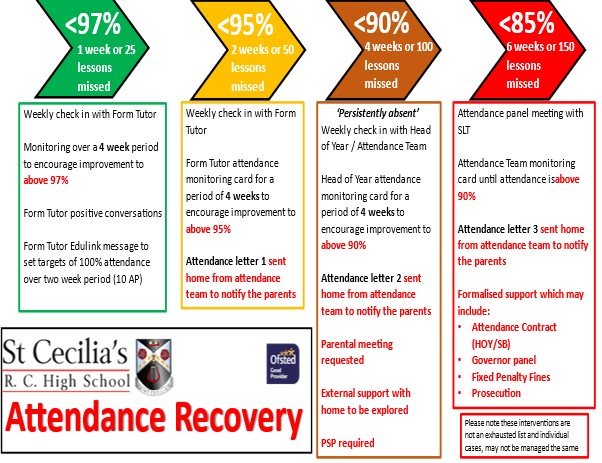Attendance and Punctuality
Everyone at St Cecilia’s RC High School recognizes and understands the importance of attendance and punctuality. First and foremost, ‘attendance and being punctual’ are two vital life skills. Attending St Cecilia’s is important to your child’s safety, wellbeing, achievement, and wider development.
Everyone at St Cecilia's is committed to providing a broad, balanced and effective education for all of our children. In order to maximise our impact, it is essential that all pupils are in school, on time, every day that school is open unless the reason for the absence is unavoidable. We believe that regular attendance is of the greatest importance so that children:
• Have full access to the curriculum and are more likely to achieve well and leave school with the vital skills and knowledge they need for their future lives
• Are able to build positive relationships and develop social skills which prepare them for the next phase in their education
• Are able to develop their self-esteem, their sense of worth and sense of belonging
• Are able to develop a positive attitude to school and the world of work, understanding how important it is to be punctual and reliable
Being 15 minutes late each day is the same as missing two weeks of school over the year. The start of the school day is an important %me for children to develop their social skills with their peers, as well as preparing them for their learning. We expect our pupils to be on site at 8.45am every day. It is the role of parents, guardians and the school to encourage 100% a4endance for every child. We will therefore strive to monitor attendance and support pupils (and families) who are experiencing difficulties over attendance.
Here at St Cecilia’s, we believe that:
- Pupils are safe when they attend school
- Regular attendance promotes the effective and continuous learning of all pupils;
- Regular attendance promotes positive friendships and well-being;
- Pupils who have high attendance are more likely to achieve their full potential
- Good habits of attendance and punctuality will assist to develop self-discipline and responsibility in preparation for future employment.
All pupils should aim to attend school every day and be on time except where illness makes this not possible. Our aim for all pupils is a minimum of at least 97% attendance.
How does attendance affect outcomes for pupils?
Educational research shows that pupils who have good attendance are more likely to perform better in their examinations.
“Secondary school pupils who didn’t achieve grade 9 to 4 in English and Maths missed on 10 more days on average over the key stage than those who achieved grade 9 to 5 in both English and Maths”.
Rewarding positive attendance
There are 190 possible days of school attendance per year, 950 days in education at St Cecilia’s. Every moment in school counts, and days missed add up quickly. We recognise and reward pupils who have positive attendance.

Supporting pupils and families through interventions
In similar fashion, we have various systems and structures in place to support students and families to improve attendance.

What does attendance, as a percentage actually mean and how does it affect my child?
Data from 2019 shows that 84% of Key Stage 2 pupils who had 100% attendance achieved the expected standard, compared to 40% of pupils who were persistently absent across the key stage.
Whilst most people would be proud of 90% in any form of assessment, or celebrate 90% of a lottery win, a pupil with 90% attendance means that they are classed as being ‘persistently absent’ from school. This triggers various different strategies (outlined in the graphic above) of interventions in line with our school attendance policy and local authority direction.
*A child with 90% attendance is the equivalent to missing 100 hours of learning in an academic year
*90% attendance means one half day absence each week; four weeks over a year and half a
*If you improve your attendance to between 91% and 93% your chances of getting five 9 –
4 grades at GCSE increases from 25% to 75%
*Research indicates that pupils with no absence, are more than twice as likely to achieve 5 or more GCSEs 9 – 4 and 3 times as likely to get 5 or more GCSEs 9 – 4 including Maths and English.

Parents and carers responsibilities
Parents and carers have a legal duty to ensure your child gets a full time-education. Usually, that means going into school from the age of 5 to 16.
There are only a small number of circumstances where missing a school day is permitted. Your child must attend every day that the school is open, unless:
- Your child is too ill to attend.
- You have asked in advance and been given permission by the school for your child to be absent on a specific day due to exceptional circumstances.
- Your child cannot go to school on a specific day because they are observing a religious event.
- Your local authority is responsible for arranging your child’s transport to school and it’s not available or has not been provided yet.
- Your child does not have a permanent address and you are required to travel for work. This exception only applies if your child attends their usual school or another school where you are staying as often as possible. This must be 200 half days or more a year if they are aged 6 or older.
The attendance team monitor attendance closely and will contact parents if there are concerns with a pupils’ attendance. If these cannot be rectified we will contact the local School Attendance Enforcement Team for support.
Pupils who arrive after 8.45am in the morning will be marked late. Any pupil who is late in the morning will be asked to complete a lunchtime detention. Pupils who are persistently late will have further intervention to try to find solutions to the problem.
What should I do if my child can’t attend school?
If your child is unable to attend school for any reason you should telephone the school attendance office on 01772 783074 to inform the attendance team of the reason. You are able to record this on answer phone. If a pupil is absent and we haven’t received an explanation this will trigger an automated text message and/or a phone call. If your child has been missing school without a reason, the absences will be unauthorised and will carry the risk of a penalty notice or prosecution. If you have concerns about your child's attendance, you can contact the school to discuss what help might be available.
Please note that the decision to authorise absences rests with schools and not parents.
Unauthorised absence
Unacceptable reasons for absence include
• Shopping
• Holidays in term time which are not authorised by your child's school (see below)
• Hair cut
• Truancy
• Airport visits
• Birthday treats
• Days out / trips
• Looking after brothers and sisters at home
• Non-urgent medical or dental appointments
• Oversleeping
• Working
Education Penalty Notices
Under the Education Act 1996, parents and carers have a duty to make sure their children regularly attend school. If parents or carers fail to do this, they can be prosecuted. Working within a Code of Conduct the Local Authority can issue a penalty notice to parents or carers if a child has missed a number of sessions without permission from the school.

Holidays During Term Time
Amendments have been made to the 2006 regulations in the Education (Pupil Registration) (England) (Amendment) Regulations 2013. From 1st September 2013 this prevents Headteachers from authorising holidays/absence during term time. Leave of absence from school should only be in exceptional circumstances and this is at the Headteachers discretion.
Parents can be fined for taking their child on holiday during term time without consent from the school
Application for Leave of Absence
Please note that there is no automatic right for a pupil’s leave of absence. The school will consider a request for leave of absence in relation to the exceptional circumstances of the application together with the pupil’s attendance and educational attainment.
Medical Appointments
If possible all appointments should be arranged out of school hours to ensure minimum disruption to your child’s education. When appointments have to be made in school hours a note asking for release must be sent to the Form Tutor.
Attendance Policy
Attendance
Our recommendations for success
Everyone has the knowledge and understanding of the powerful impact of regular attendance on success.
• Try to establish a good routine early so that when your child does start school they are in good habits such as getting plenty of sleep
• If appointments are needed for health reasons, try to make them outside of school hours, or out of term time
• Offer support with homework and take an interest in their learning
• Encourage you child to get involved in the many extracurricular activities we offer at our school
• Attend parents’ evenings to discuss your child’s progress
• Take trips during school holidays rather than term time
• Don’t allow your child to stay off school for a minor ailment
• If attendance is of concern, speak with your child and communicate your worries with school - we want to help
.
